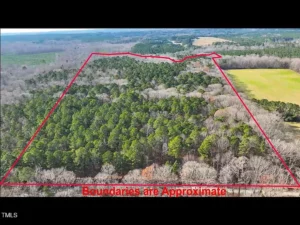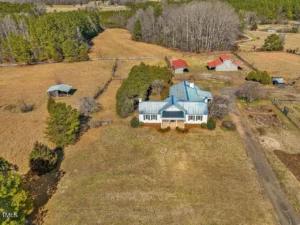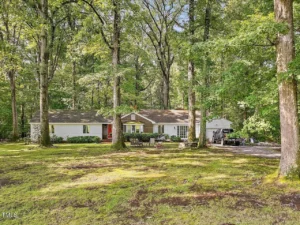If you and other family members find yourselves the beneficiaries of inherited land, there are a few things you should know. In this video, Real Estate Expert Eric Andrews reviews some of the issues people encounter when they inherit and/or sell inherited land. Eric has assisted dozens of people in situations where land has been passed down with or without a will and has dealt with divorces, separations, kids, grandkids, and great-grandchildren.
Interviewer: Tell us a little bit more about inheriting land and estates.
Eric: Well, unfortunately it is one of the main reasons why people sell real estate is their passing.
Interviewer: Land or residential or both?
Eric: Well, probably land more so than residential. Yeah. And land will usually be a multiple heir situation. So North Carolina is tenancy by the entireties, which means if you are married, unless other provisions are made, the spouse gets the property. So if dad dies, mom gets the property. If dad was married to mom for 50 years and they break up and he gets remarried, the new spouse gets the property. And that tends to cause problems in my office. So I’m not an attorney and I’m not a real estate attorney, but I have a lot of people come and ask me things as far as estates are concerned. And one of the worst things we get happen is if somebody dies without a will and it does get complicated. So dad passes, mom gets the property.
Mom passes, mom had five children, four of them are married, Billy, the youngest separated from his wife 13 years ago, but they just haven’t gone through the bother of getting the divorce. She still has an interest in the property. So all the heirs have an interest in the property and all the heirs that are married, their spouses have interest in the property. So that can cause complications. There are four heirs and one passes and they’re not married, but they have kids. Those kids have a divided quarter interest in the property.
Interviewer: To sell it, does everybody have to agree?
Eric: Yes.
Interviewer: That they’re going to sell it?
Eric: They do. And if they don’t agree, there’s a court order called a petition for a partition. And that means you’re going to the court. And you’re saying, look, we can’t agree. We’re either going to cut this up. And then the judges hire local experts to figure out how that property can be divided called commissioners of the court. And I’ve been involved with several of those as a land consultant. And because I know the marketability of property and appraisers are usually people that are involved. And so I work with some of the local appraisers. And so we figure out, and you would think you could have a block of property and it’s 30 acres and there’s three airs, oh, that’s easy, 10 acres each. It is not easy. And now we’ve talked previously about road frontage. That’s super important. There might be wetlands. That’s super important. We don’t have a whole lot of municipal sewer out here. So where it perks and what it perks for is super important.
There might be a house on the property and Bobby’s living in the house and the other two aren’t, so Bobby might get less acreage and the other two will get more acreage. Bobby wants to stay in the house. So it can get very, very complicated when someone passes. And so of course, if somebody wants some basic information saying, I just inherited this property. I want to sell it. I can certainly give them some rudimentary background on how it might go down, but will always revert to the professionals of an estate or a real estate attorney that will let them know who has what interests. And it is unfortunate. It does get into situations where siblings don’t get along, or a sibling will have a spouse that thinks that they should have more of an interest. One of the most awful things that will happen is, we’ll have three heirs and they wish to sell the property.
And they inherited the property 20, 25 years ago. And Jimmy has made sure that the property taxes have been paid for 25 years. Well, Jimmy wants a bigger share and he gets a one third share. He should have been collecting those taxes from his other siblings all the time. So there’s a lot of bad resentment sometimes when it comes to siblings and everything. I have gone to family reunions on some big tracks of land. I worked with an attorney on a 600 acre track, and there were, I’m going to round off the numbers because I don’t remember it clearly, but there were like 50 family members that had a share in a 600 acre track.
And so in order to explain the value to them and what I could do for them and the real estate attorney was there. We went to the family reunion fish fry, I remember that lady said, you sure do eat a lot of fish because I was eating a lot of fish. It was so good. It was so good. But we had some pseudo attorneys in the group that thought they’d knew a little bit more than they did and everybody wanted a little bit more. And with 50 years it gets very complicated.
We couldn’t work it out. And the head of the estate came back to me like three and a half years later. And it was almost 200 heirs. And I had a good friend of mine, a minister and he said it in a way that is much more polite than I’m probably going to say it now, but he said, there are two things people won’t stop doing. One’s a really bad word. I won’t say, making babies. And the other one unfortunately is dying. And really making babies doesn’t change your heirs as much as dying does. And so we have a woman in the family that has passed and she had four kids and one of her kids passed. Well, that one woman passing, all of a sudden now we can have 10 heirs just like that.
And so these estates can get really, really complicated. But basically if there’s a will and everybody’s getting along, land is very, very common to sell with multiple heirs. And I’ve been fortunate that this community has allowed me to help so many families that I feel as though I’m one of the most experienced agents in the area as far as estate are concerned, I can give pretty good advice, not legal advice, but I can give good selling advice.





